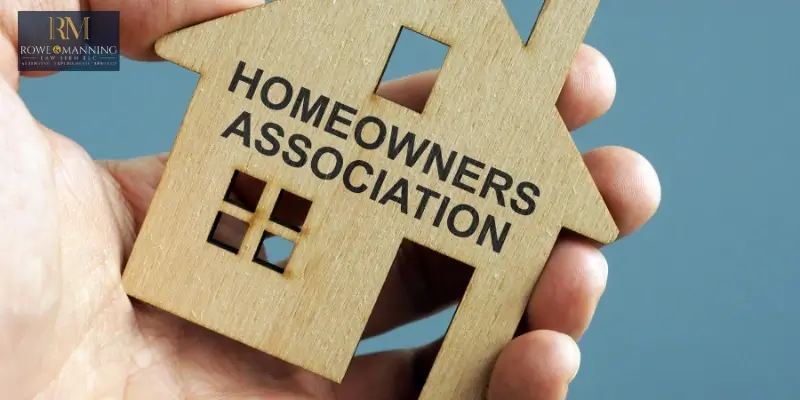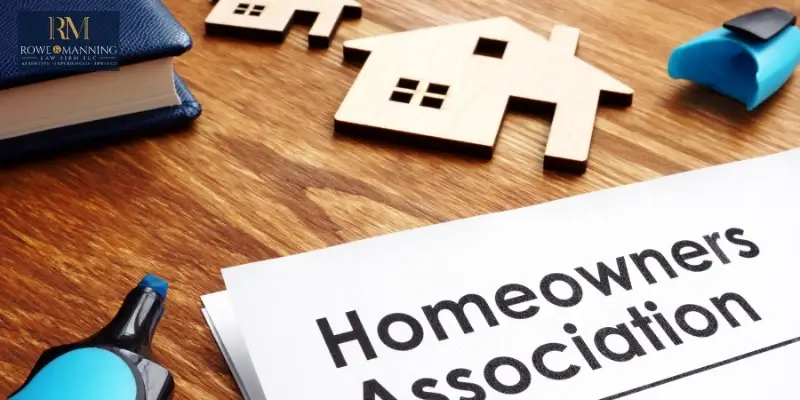Baton Rouge Homeowners Association (HOA) Attorneys
Homeowners associations, or HOAs, play an important role in maintaining their local communities, but conflicts can arise that bring into question the legality of an HOA decision. When an HOA misuses its power, it can lead to frustrating disputes. Explore your options to resolve issues with an HOA by contacting a Baton Rouge Homeowners Association (HOA) lawyer.

Stay Ahead of the Curve
Rowe & Manning Law Firm, LLC, has over 15 years of experience providing personalized attention to their clients. The firm’s attentive work ethic and wide range of experience allow us to handle a variety of cases, including HOA disputes.
HOA Rules and Regulations
HOAs are governed by a set of legal documents called Covenants, Conditions, and Restrictions, or CC&Rs. These outline the rules and restrictions for homeowners in the community. CC&Rs give the HOA the authority to enforce rules and manage the community, but this must be done fairly. If an HOA board attempts to enforce arbitrary rules or discriminates in how it enforces them, homeowners have the right to challenge their actions.
Many rules created by an HOA are established to maintain property values and create a community that is a nice place to live. However, these interests have to be balanced with the rights of homeowners so that they can enjoy their property. It is important to understand the level of authority HOAs have and how they can enforce rules to avoid unnecessary conflicts. This also includes the process of amending or repealing rules by vote.
Common matters that homeowners association CC&Rs address are:
- Architectural standards. An HOA can restrict the type of materials and colors homeowners use on the exterior of their homes.
- CC&Rs can regulate the type of plants used and standards of maintenance.
- Use of Property. Home-based businesses and short-term rentals can be limited by an HOA.
- Noise and nuisance. CC&Rs can lay out rules for maintaining a peaceful environment for the community.
Legal Options for Homeowners
If homeowners in Baton Rouge feel their HOA is overstepping its authority or acting unfairly, there are several legal avenues they can pursue. The first step is usually direct communication with the board. This channel allows homeowners to outline their concerns and request reconsideration or at least an explanation of the board’s actions.
Sometimes, direct communication is unsuccessful. If this is the case, then homeowners can use alternative forms of dispute resolution like arbitration or mediation. These processes involve working with a third party to encourage both sides to reach a compromise without going to court. If this process does not work, filing a legal claim against an HOA may be necessary.
A legal claim against an HOA or its board can be based on a number of reasons. If they are not transparent or effective regarding the management of their money, this would be considered a breach of fiduciary duty. The HOA could also be accused of not maintaining common areas or discriminating when enforcing rules.
How to Prove a Claim
If an HOA board neglects its financial obligations or acts in its own self-interest by mismanaging the budget or not managing property appropriately, this could be considered negligence or a breach of fiduciary duty. These situations could call for legal recourse to protect property investment and hold the board accountable.
To begin the process, homeowners must prove that the board acted outside its authority or was negligent. This usually requires evidence, including meeting minutes, financial records, and communications. These forms of evidence might prove that the board knew about their obligations but failed to uphold them.
For example, if the board knew about common areas needing repair but did not address them promptly, this could be considered a breach of duty. This is especially true if these issues lead to safety hazards or property damage. If the HOA’s negligence or misconduct significantly harms the community, filing a legal claim might be the only way to protect homeowners’ rights and ensure the board is acting within its legal rights.

FAQs About Homeowners Association (HOA) Law in Baton Rouge,LA
What Are the Most Common Disputes Between Homeowners and HOAs?
The most common disputes between homeowners and HOAs usually involve issues based on rule enforcement. It is common for homeowners to disagree with HOA board decisions on things like changes to architecture, requirements for landscaping, and complaints about noise and other issues. Another frequent area of contention includes the fines HOAs can levy to homeowners who violate the rules, which homeowners can find unfair or exorbitant.
Can an HOA Legally Enforce Its Rules?
An HOA can legally enforce its rules as long as they are clearly stated in its governing documents. In Louisiana, HOAs can regulate shared or common areas and collect fees to maintain them. They can also collect assessment payments and levy fines on members for not following the HOA rules. The governing documents can grant additional powers, such as restricting home colors, fence designs, and membership requirements.
What Rights Do Homeowners Have Against HOAs?
Homeowners have numerous rights against HOAs. They can attend and participate in board meetings and vote on issues that might affect them. Homeowners can also review the HOA’s financial records to ensure transparency about financial management. A complaint can be filed if a member believes that the HOA made a decision that violates their governing documents or Louisiana law.
What Legal Responsibilities Do HOAs Have?
HOAs have legal responsibilities, including the duty to act in the community’s interests. They must use any funds collected responsibly and maintain common areas properly. If they do not enforce their rules fairly or act discriminatorily or secretively, homeowners can take legal action against the HOA. This is generally considered negligence or acting in bad faith.
Address Issues With Your HOA
While HOAs can be important for maintaining a standard within a community, they can also overstep their boundaries. Stand up for your rights by challenging unfair practices. This can help preserve your home as your sanctuary and make your voice heard. Schedule a consultation with Rowe & Manning Law Firm, LLC, today to find clarity on an HOA issue.

